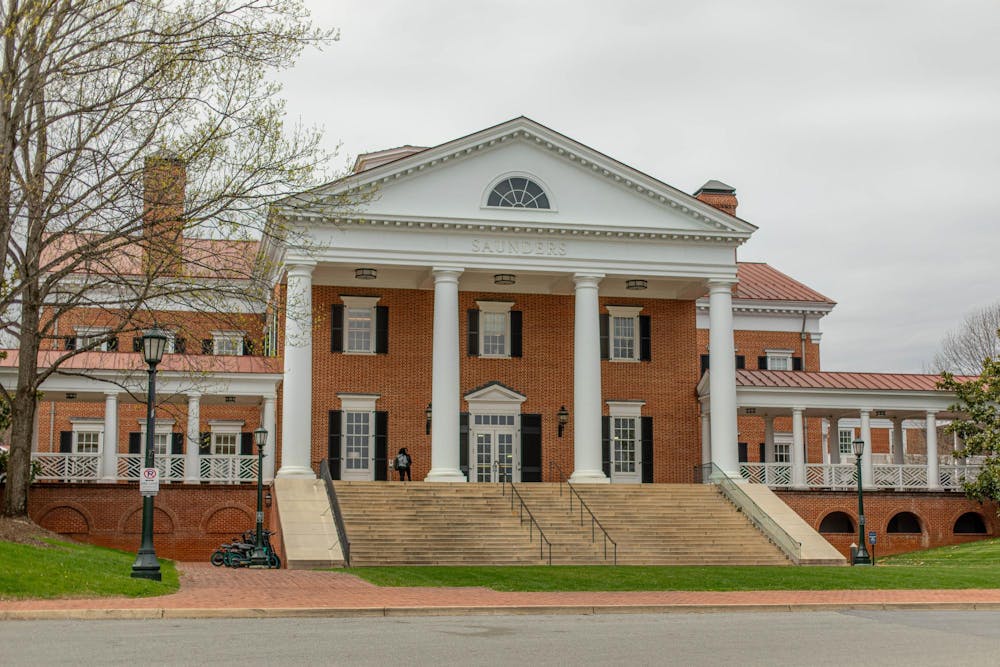In a secondary review process to the University-wide compliance review, attorneys from McGuireWoods — the University’s outside law firm — have conducted interviews and began a secondary compliance review across all 12 schools of the University.
The interviews began the week of Ryan’s resignation and were paused by July 17 according to Faculty Senate Chair Jeri Seidman. The interviews were often described as aggressive and demeaning interrogations. According to University Spokesperson Bethanie Glover, the compliance review process is aimed to provide the University with legal advice to ensure current policies and practices comply with federal anti-discrimination laws and the March 7 resolution by the Board of Visitors.
This secondary review is a continuation of the University-wide preliminary compliance review, which the University Counsel conducted beginning late May. The preliminary review was performed in accordance with the Board’s decision March 7 to dissolve the Office of Diversity, Equity, Inclusion and Community Partnerships to abide by federal law.
Glover confirmed that schools across Grounds began reviewing their policies and practices last spring to ensure compliance with federal anti-discrimination laws, as called for in the March 7 resolution by the Board. According to Glover, University Counsel provided a guidance document outlining principles to inform the University’s compliance efforts.
Glover said that mid-June, the University arranged for McGuireWoods to conduct a review to provide legal advice and ensure compliance with federal anti-discrimination laws. The review was conducted under attorney-client privilege — only the University and its attorneys have access to materials generated under the review — and matters will remain confidential.
Seidman said that she heard about the interviews July 15, and she spoke with multiple senior level administrators that day and the following day to relay the concerns brought by the faculty and staff and urge for them to halt.
“I really pushed for the interviews to be paused because it seemed like the scope of the compliance review was unclear, as well as the methods and faculty rights and obligations,” Seidman said.
Seidman was informed July 17 that the interviews had paused while the scope and methods of the compliance review were clarified. Seidman said that during the halt, the desk review portion of the compliance review has continued.
In addition to asking that the interviews pause for clarification, Seidman also collected any faculty questions into a document that she submitted July 23 to University Counsel Cliff Iler. In her email to Iler, Seidman requested that the faculty’s questions be answered before interviews recommence.
Walter Heinecke, former president of the American Association of University Professors chapter at the University and associate professor in the School of Education and Human Development, said some faculty left the interviews fearful and unsure of their rights. Heinecke did not experience the interviews firsthand.
“We also heard that during those compliance reviews, the faculty were told not to talk to anybody about it — so basically, they were being told that there was a gag order on their participation,” Heinecke said.
According to Iler, faculty and staff were instructed not to discuss the interviews because the review’s success hinges on confidentiality.
“If information from the interviews is shared publicly, it will make others less likely to speak frankly,” Iler wrote in a statement to Seidman. “Navigating this review quickly and truthfully will allow us to send a strong message to students, faculty, staff, parents and alumni that we continue to be focused on research, education and furthering the University's mission in the world.”
When asked by Seidman whether faculty are obligated to participate in interviews, Iler said that the University “expects” faculty members to participate in the review when asked. Iler said he expected only a small number will be interviewed, and that these individuals are key to the success of the review to assist the University at large.
Generally, Iler said in response to Seidman that employees do not have the right to bring personal attorneys to meetings with the University, which includes compliance interviews. Only the employee and counsel for the University may attend interviews.
Iler said subjects of research and academic content will not be questioned during the interviews, and faculty will not be asked to submit notes, syllabi or research paper drafts. Iler also said admissions processes will only be the subject of inquiry to confirm that admissions decisions are not based on sex, race, natural origin or other protected characteristics.
According to Glover, the review “is not intended to target individuals or units for non-compliance.”
Various faculty members were contacted via email by The Cavalier Daily, but they did not respond to a request for comment. According to Heinecke, most faculty from all 12 schools are afraid to talk about the process due to a "palpable culture of retaliation.”
Heinecke confirmed that the AAUP chapter of the University has engaged legal counsel to provide consultation and possible representation throughout the compliance review process.
Heinecke said that he believes the review crosses the boundary between legally ensuring compliance and meddling with academic freedom.
“It sounded like, to me, that it was beyond the scope of any regular compliance review … Members of the faculty who were being interviewed were being asked about their teaching and their research related to DEI, which our understanding is that that is off limits,” Heinecke said.
A previous version of this article incorrectly stated that McGuireWoods is the BOV’s outside law firm. It represents the University. The article has been updated to reflect this change.







